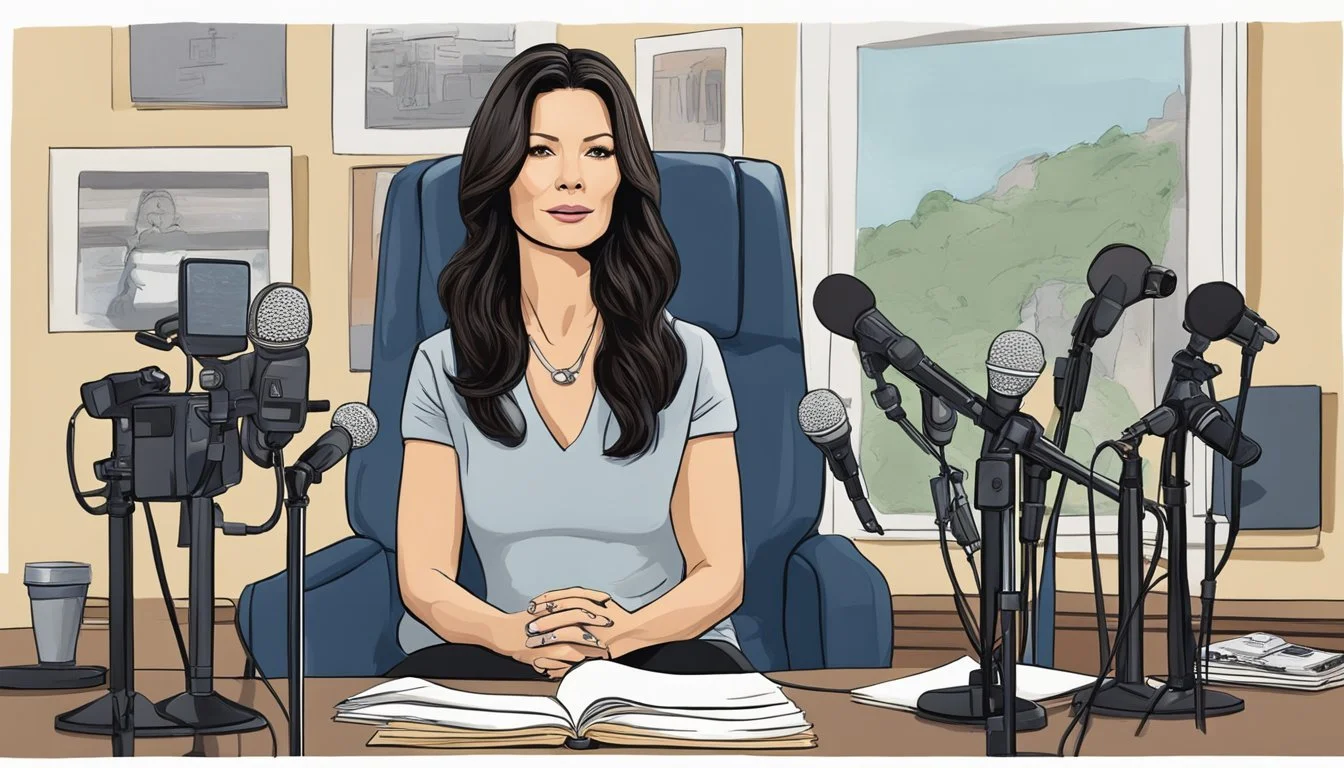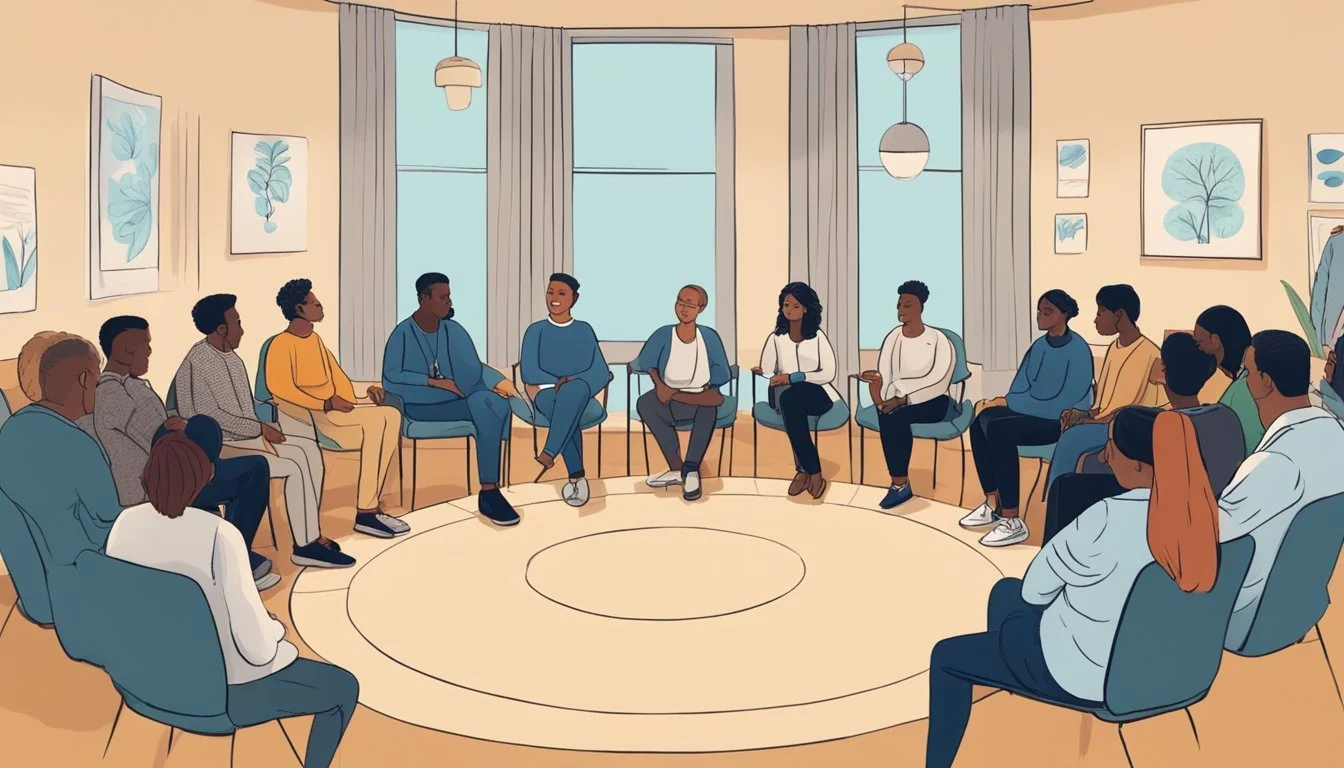9 Famous People Who Have Opened Up About Their BPD Diagnosis
Celebrities Discuss Borderline Personality Disorder
Borderline Personality Disorder (BPD) affects millions worldwide, including some well-known public figures. These celebrities have chosen to speak openly about their experiences, helping to raise awareness and reduce stigma surrounding mental health issues. Their candid discussions shed light on the challenges of living with BPD and the importance of seeking proper diagnosis and treatment.
By sharing their personal journeys, these famous individuals demonstrate that BPD does not define a person's potential for success or happiness. Their stories offer hope and encouragement to others facing similar struggles, while also educating the public about the complex nature of this disorder. From actors and musicians to comedians and athletes, these nine personalities represent diverse fields and backgrounds, illustrating that BPD can affect anyone regardless of their status or achievements.
1) Angelina Jolie
Angelina Jolie, renowned actress and humanitarian, has been open about her struggles with mental health, including her diagnosis of Borderline Personality Disorder (BPD). The Oscar-winning star has spoken candidly about her experiences in various interviews and public appearances.
Jolie's journey with BPD has been marked by intense emotions and relationship challenges. She has described experiencing extreme mood swings and difficulties in maintaining stable personal connections, which are common symptoms of the disorder.
The actress has emphasized the importance of seeking professional help and support. Jolie has undergone therapy and worked on developing coping mechanisms to manage her BPD symptoms effectively.
Despite the challenges, Jolie has used her platform to raise awareness about mental health issues. She has encouraged others to seek help and reduce the stigma surrounding BPD and other mental health conditions.
Jolie's openness about her diagnosis has helped many fans and individuals with BPD feel less alone. Her success in both her personal and professional life serves as an inspiration to those managing similar struggles.
2) Pete Davidson
Pete Davidson, known for his work on Saturday Night Live and in films, has been open about his struggles with borderline personality disorder (BPD). He received his diagnosis in 2017 after years of battling depression and other mental health challenges.
Davidson has spoken candidly about his experience with BPD in various interviews and public appearances. He described the relief he felt upon finally receiving a diagnosis, as it helped him understand the root of his emotional struggles.
One of the symptoms Davidson has discussed is the fear of abandonment, a common trait among those with BPD. He has shared how this fear has impacted his relationships and daily life.
The comedian has also been vocal about the importance of seeking help and proper treatment. He has mentioned utilizing therapy and medication to manage his symptoms, emphasizing the positive impact these interventions have had on his life.
By sharing his story, Davidson has contributed to raising awareness about BPD and reducing the stigma surrounding mental health issues. His openness has resonated with many who face similar challenges, providing a relatable public figure for those dealing with BPD.
3) Mariah Carey
Mariah Carey, the renowned singer and songwriter, revealed her bipolar disorder diagnosis in 2018. She first received the diagnosis in 2001 after experiencing a physical and mental breakdown.
For years, Carey kept her condition private, fearing the potential impact on her career and public image. She initially believed she was suffering from a severe sleep disorder.
Carey's symptoms aligned with bipolar II disorder, characterized by periods of depression and hypomania. During manic episodes, she experienced intense creativity and productivity, often working long hours without sleep.
The singer sought treatment, including therapy and medication, to manage her condition. She found that proper care allowed her to live a more balanced life and continue her successful career.
By sharing her story, Carey aimed to reduce stigma surrounding mental health issues. She emphasized the importance of seeking help and not letting fear or shame prevent individuals from getting the support they need.
Carey's openness about her bipolar disorder has inspired many fans and fellow celebrities. Her journey demonstrates that mental health challenges can affect anyone, regardless of fame or success.
4) Brandon Marshall
Brandon Marshall, a former NFL wide receiver, has been candid about his struggles with borderline personality disorder (BPD). He played for several teams during his professional career, including the Denver Broncos, Chicago Bears, and New York Jets.
Marshall received his BPD diagnosis in 2011. He chose to speak openly about his mental health challenges, which was uncommon for professional athletes at the time.
The football star has worked to raise awareness and reduce stigma surrounding mental illness. He established a foundation called Project 375 to promote mental health education and support.
Marshall has shared how therapy and treatment have helped him manage his BPD symptoms. He credits dialectical behavior therapy (DBT) as a particularly effective approach for his recovery.
Through his advocacy work, Marshall aims to encourage others to seek help for mental health issues. He emphasizes the importance of addressing mental health concerns, especially in male-dominated fields like professional sports.
5) Halsey
Halsey, the American singer-songwriter, has been open about her struggles with borderline personality disorder. She received her diagnosis in 2017 and has since used her platform to raise awareness about mental health issues.
The artist has spoken candidly about her experiences with BPD in interviews and on social media. Halsey has described dealing with intense emotions, impulsivity, and difficulties in relationships.
She has emphasized the importance of seeking professional help and proper treatment. Halsey credits therapy and medication as crucial components of her mental health management.
Through her music, Halsey often explores themes related to her mental health journey. Several of her songs touch on the complexities of living with BPD and other mental health conditions.
By sharing her story, Halsey aims to reduce stigma surrounding mental illness. She encourages fans to prioritize their mental well-being and seek support when needed.
6) Darrell Hammond
Darrell Hammond, renowned for his impressions on Saturday Night Live, has spoken openly about his struggle with borderline personality disorder. The comedian was diagnosed with BPD after years of battling mental health issues and substance abuse.
Hammond's journey with BPD was marked by intense emotional experiences and difficulties in maintaining stable relationships. He often used alcohol and drugs as coping mechanisms, which further complicated his condition.
In his memoir "God, If You're Not Up There, I'm F*cked," Hammond detailed his experiences with BPD and the challenges he faced. He described feeling empty and struggling with a fragmented sense of self.
Through therapy and treatment, Hammond has worked to manage his BPD symptoms. He has become an advocate for mental health awareness, sharing his story to help others understand and cope with the disorder.
Hammond's openness about his diagnosis has contributed to reducing stigma surrounding BPD. His willingness to discuss his experiences has provided insight into the daily challenges faced by individuals with this complex disorder.
7) Jean-Claude Van Damme
Jean-Claude Van Damme, the renowned Belgian actor and martial artist, has been open about his struggles with bipolar disorder. In 2011, he publicly revealed his diagnosis during an interview with The Guardian.
Van Damme described experiencing intense mood swings that affected his personal and professional life. He admitted to self-medicating with cocaine in the 1990s, which exacerbated his condition.
The action star sought professional help and underwent treatment, including therapy and medication. He credits this support for helping him manage his symptoms and regain control of his life.
Van Damme's disclosure has contributed to raising awareness about bipolar disorder in the entertainment industry. He has used his platform to discuss the importance of mental health care and destigmatizing mental illness.
Despite the challenges, Van Damme has continued his successful career in film. He has demonstrated resilience and determination in managing his condition while maintaining his status as a popular action movie star.
8) Catherine Zeta-Jones
Catherine Zeta-Jones, the acclaimed Welsh actress, has been open about her struggle with bipolar II disorder. She first revealed her diagnosis in 2011, after seeking treatment at a mental health facility.
The Oscar-winning star has spoken candidly about her experiences with the condition. She has described dealing with extreme mood swings, including periods of depression and hypomania.
Zeta-Jones has emphasized the importance of seeking help and reducing stigma around mental health issues. She credits proper treatment and support from her family, including husband Michael Douglas, in managing her condition.
The actress has used her platform to raise awareness about bipolar disorder. She encourages others to seek professional help if they are experiencing symptoms.
Zeta-Jones continues to have a successful career in film and television while managing her mental health. Her openness has helped many fans feel less alone in their own struggles with bipolar disorder.
9) Michael Angelakos
Michael Angelakos, the lead singer of indie electronic band Passion Pit, has been open about his struggles with bipolar disorder. He was diagnosed at age 19, a revelation that initially left him confused and searching for quick solutions.
Angelakos has used his platform to raise awareness about mental health issues. He has spoken candidly about his experiences in interviews and through his music.
The artist has described how his condition influenced his creative process. He found that the challenges he faced became a source of strength and inspiration for his work.
Angelakos has also advocated for mental health support and understanding. He emphasizes the importance of open dialogue about mental health issues in the music industry and society at large.
Through his advocacy and art, Angelakos continues to contribute to the conversation surrounding mental health. His openness has helped reduce stigma and provide support to others facing similar challenges.
Understanding BPD
Borderline Personality Disorder (BPD) is a complex mental health condition characterized by intense emotions, unstable relationships, and impulsive behaviors. It affects how a person thinks, feels, and interacts with others.
What Is BPD?
BPD is a psychiatric disorder that impacts a person's ability to regulate emotions and maintain stable relationships. It typically begins in early adulthood and can significantly disrupt daily life.
People with BPD often experience intense mood swings, fear of abandonment, and a distorted sense of self. These symptoms can lead to impulsive actions and unstable relationships.
The exact cause of BPD is unknown, but researchers believe it results from a combination of genetic, environmental, and neurological factors. Childhood trauma or neglect may increase the risk of developing BPD.
Symptoms and Diagnosis
BPD symptoms include:
Intense, unstable emotions
Chronic feelings of emptiness
Impulsive behaviors
Self-harm or suicidal thoughts
Fear of abandonment
Unstable relationships
Identity disturbances
Diagnosis requires a thorough evaluation by a mental health professional. At least five of the nine criteria in the Diagnostic and Statistical Manual of Mental Disorders (DSM-5) must be present for a BPD diagnosis.
Early diagnosis and treatment are crucial for managing symptoms and improving quality of life.
Common Misconceptions
Several myths surround BPD, leading to stigma and misunderstanding:
Myth: BPD is untreatable. Fact: Various effective treatments exist, including therapy and medication.
Myth: People with BPD are manipulative. Fact: Their behaviors stem from intense emotions, not intentional manipulation.
Myth: Only women have BPD. Fact: BPD affects both men and women, though it's more commonly diagnosed in women.
Myth: BPD is a lifelong condition. Fact: Many people with BPD experience significant improvement with proper treatment.
Treatment and Management
Effective treatment for BPD involves a combination of therapeutic approaches, medication, and self-care strategies. These methods aim to reduce symptoms, improve emotional regulation, and enhance overall quality of life for individuals with the disorder.
Therapeutic Approaches
Psychotherapy forms the cornerstone of BPD treatment. Dialectical Behavior Therapy (DBT) is widely recognized as the most effective approach. DBT teaches skills in mindfulness, distress tolerance, emotion regulation, and interpersonal effectiveness.
Cognitive Behavioral Therapy (CBT) helps individuals identify and change negative thought patterns and behaviors. Mentalization-Based Therapy (MBT) focuses on improving the ability to understand one's own and others' mental states.
Schema-focused therapy and Transference-focused psychotherapy are also used to address core emotional and relationship issues in BPD.
Medications
While no specific medication is approved to treat BPD itself, certain drugs can help manage associated symptoms. Antidepressants may alleviate depressive episodes and anxiety.
Mood stabilizers can help regulate emotions and reduce impulsivity. In some cases, low-dose antipsychotics are prescribed to address symptoms like paranoid thoughts or severe emotional instability.
It's crucial to note that medication is typically used in conjunction with psychotherapy, not as a standalone treatment for BPD.
Self-Care Strategies
Self-care plays a vital role in managing BPD symptoms. Regular exercise can help reduce stress and improve mood. Practicing mindfulness and meditation techniques can enhance emotional regulation.
Maintaining a consistent sleep schedule and a balanced diet contribute to overall well-being. Building a strong support network of friends and family is essential.
Engaging in creative activities or hobbies can provide healthy outlets for emotional expression. Learning and applying stress management techniques helps individuals cope with challenging situations more effectively.







